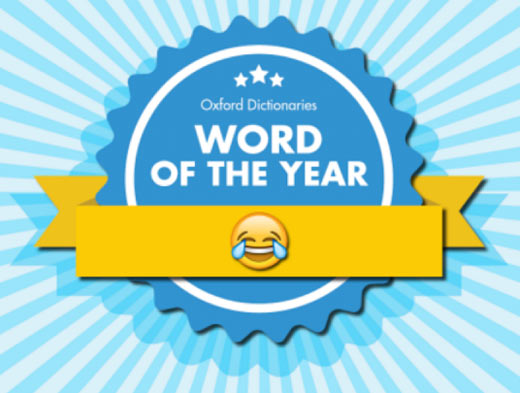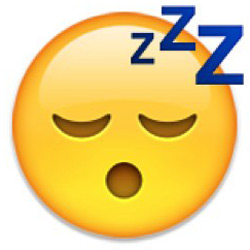當前位置: Language Tips> 雙語新聞
'Face with tears of joy' emoji named Word of the Year by Oxford Dictionaries
分享到

It may not be a word by the strictest definition – but the emoji commonly known as “face with tears of joy” has been named the “Word” of the Year for 2015 by Oxford Dictionaries.
嚴格意義上來說它不是一個詞匯——但為人熟知的“笑cry”表情已經被牛津詞典評為2015年度“詞匯”。
A breakthrough year for the pictograms first spread by texting teens has been marked by the Oxford Dictionaries’ recognition for a word or expression that “captures the ethos, mood, or preoccupations of that particular year.”
牛津詞典的認可標志著表情符號突破性發展的一年。一個單詞或短語能夠“抓住那一年的精神、情緒或極其重要的事情”即是牛津詞典的評定標準。而表情文字是最先在青少年發送的短信中傳播起來的。
The body cited Hillary Clinton soliciting feedback in emoji and on-going debates about the skin tone of smiley faces, as evidence that “emoji have come to embody a core aspect of living in a digital world that is visually driven, emotionally expressive, and obsessively immediate.”
該機構引用希拉里·克林頓(Hillary Clinton)對表情符號征求反饋意見和對笑臉的膚色進行討論為證,說明“在數字化的世界中,表情符號包含了生活中的視覺感官、情感表達等主要方面。”
Casper Grathwohl, President of Oxford Dictionaries, said: “You can see how traditional alphabet scripts have been struggling to meet the rapid-fire, visually focused demands of 21st Century communication. It’s not surprising that a pictographic script like emoji has stepped in to fill those gaps—it’s flexible, immediate, and infuses tone beautifully.
牛津詞典部長卡斯帕·格拉斯沃說:“這代表著傳統的字母式文稿正在努力達到21世紀交流的可視化、快速化要求。而出現了類似表情符號這樣的東西來填補二者之間的縫隙并不令人驚訝——因為它具有可變性、迅速性,并蘊含了感情因素。”
“As a result emoji are becoming an increasingly rich form of communication, one that transcends linguistic borders. When Andy Murray tweeted out his wedding itinerary entirely in emoji, for example, he shared a subtle mix of his feelings about the day directly with fans around the world. It was highly effective in expressing his emotions.”
“表情符號成為交流溝通中越來越豐富的形式,它超越了語言的界限。比如,安迪·穆雷完全用表情符號把他的婚禮過程在推特上發布,他直接地與世界各地的粉絲們分享了當天他微妙又復雜的情緒。用表情符號完整有效的表達了他的情緒。”
Research by mobile technology business SwiftKey found that “Face with Tears of Joy” was the most heavily used emoji globally in 2015. Their statistics showed that the character comprised 20% of all emoji used in the UK in 2015.
移動技術公司SwiftKey的研究發現“笑cry”是2015年全球使用率最高的表情符號。統計數字顯示,該表情占2015年英國使用的所有表情的20%。
Oxford Dictionaries defines a “word” variously as a “single distinct meaningful element of speech or writing” or “conceptual unit of language”, allowing emoji to take their place among more conventional communicative forms.
牛津詞典定義一個“單詞”為“語句或寫作中的單個有意義的元素”或“語言中的概念單位”,這讓表情符號能夠代替單詞在傳統交際形式中的位置。
Oxford Dictionaries lexicographers also identified a sharp increase in the use of the word emoji itself in 2015. Emoji is a loanword from Japanese defined as “a small digital image or icon used to express an idea or emotion in electronic communication.”
牛津詞典編纂者也發現在2015年單詞“emoji”使用率迅速增加。“emoji”是日語的外來詞,定義為“一個小數字圖像或在電子通信用來表達思想或情感的圖標。”
***各種emoji含義***
表情1

Slang translation: lol; lmao / Old-fashioned words: laughing out loud; laughing my ass off; I say, that’s rather funny
俚語:LOL;Lmao/解釋:大笑;笑死我了
表情2

Slang translation: beautifull; gawgeous; hotttt / Old-fashioned words:beautiful; gorgeous; jolly attractive
俚語:beautifull;;gawgeous;;hotttt/解釋:美麗;優雅;極具吸引力的
表情3

Slang translation: xoxo; xoxoxox / Old-fashioned words: hugs and kisses; hugs and kisses (in slightly greater quantity)
俚語:xoxo;xoxoxox/解釋:抱抱親親;抱抱親親(程度加強)
表情4

Slang translation: GJ; job; haha / Old-fashioned words: good job; good job; well done, that was rather funny
俚語:GJ;job;haha/解釋:好工作;干得漂亮;那真好笑
表情5

Slang translation: oml; ughh; ughhh / Old-fashioned words: Oh my Lord; oh damn; oh damn and blast
俚語:oml;;ughh;ughhh/解釋:噢,天哪;噢,該死的
表情6

Slang translation: ffs; grr / Old-fashioned words: for fuck’s sake; I’m furious (in fact I’m so furious, I’m growling)
俚語:ffs;;grr/解釋:看在他媽的份上!;我很火大(事實上我十分火大,快炸了)
表情7

Slang translation: cmeo; crbt; waa / Old-fashioned words: crying my eyes out; crying real big tears; I’m so very unhappy that I’m wailing
俚語:cmeo;;crbt;waa/解釋:痛哭;大顆大顆眼淚掉;我很不開心,我在哭
表情8

Slang translation: zzz; btd; gnstdltbbb / Old-fashioned words: I am sleepy; I’m bored to death; good night, sleep tight, don’t let the bed bugs bite
俚語:zzz;btd;gnstdltbbb/解釋:我好困;我快無聊死了;晚安-別讓臭蟲咬到!
Vocabulary
pictogram: 象形圖
ethos: 民族精神;氣質;社會思潮
preoccupation: 關注的事物
itinerary: 日程
英文來源:獨立報
譯者:張卉
審校&編輯:丹妮
上一篇 : 八句著名的名人遺言
下一篇 : 新軟件可看出你是否在假笑
分享到
關注和訂閱


電話:8610-84883645
傳真:8610-84883500
Email: languagetips@chinadaily.com.cn